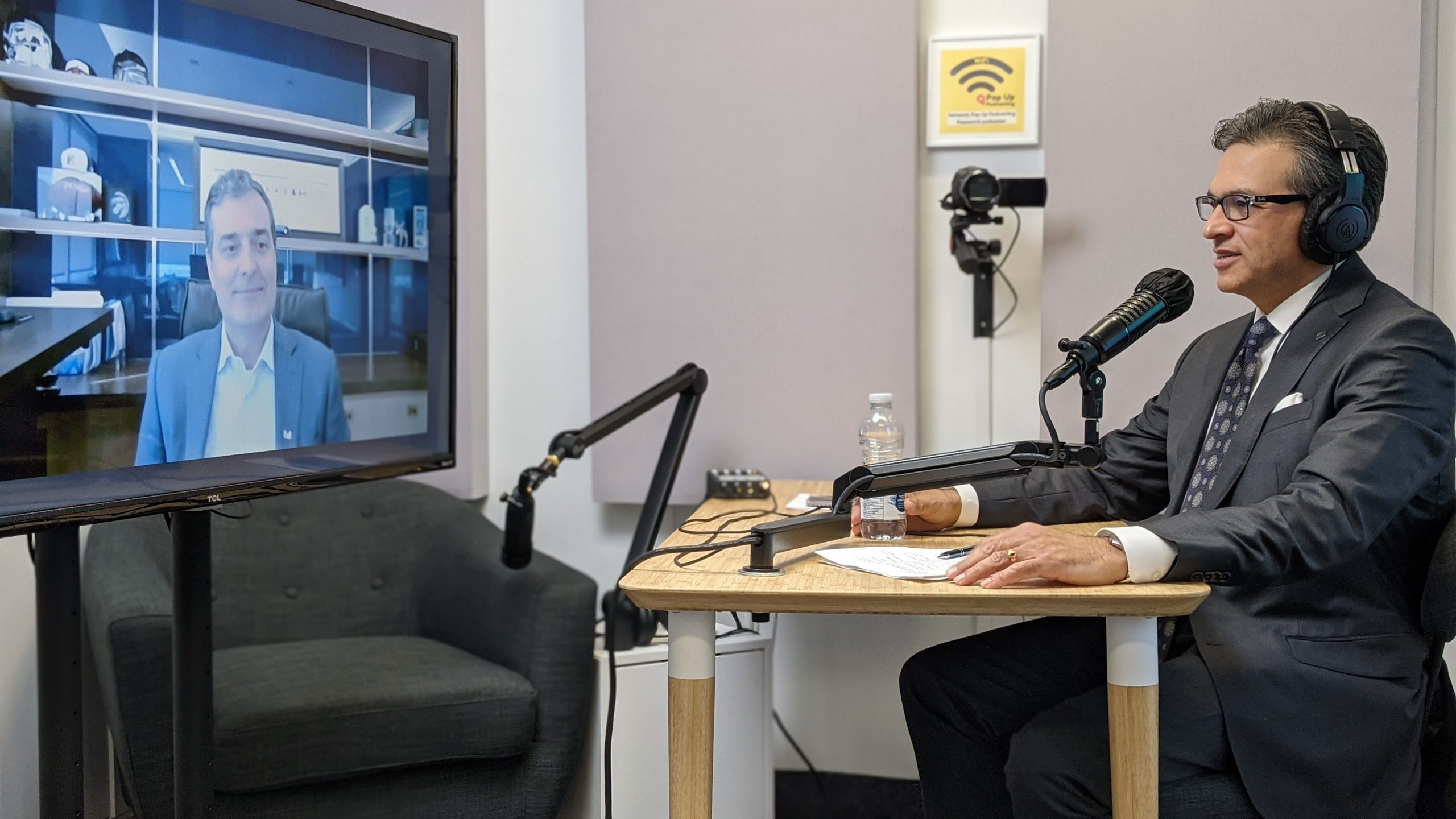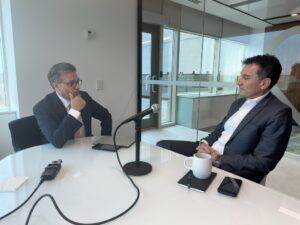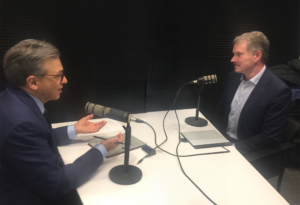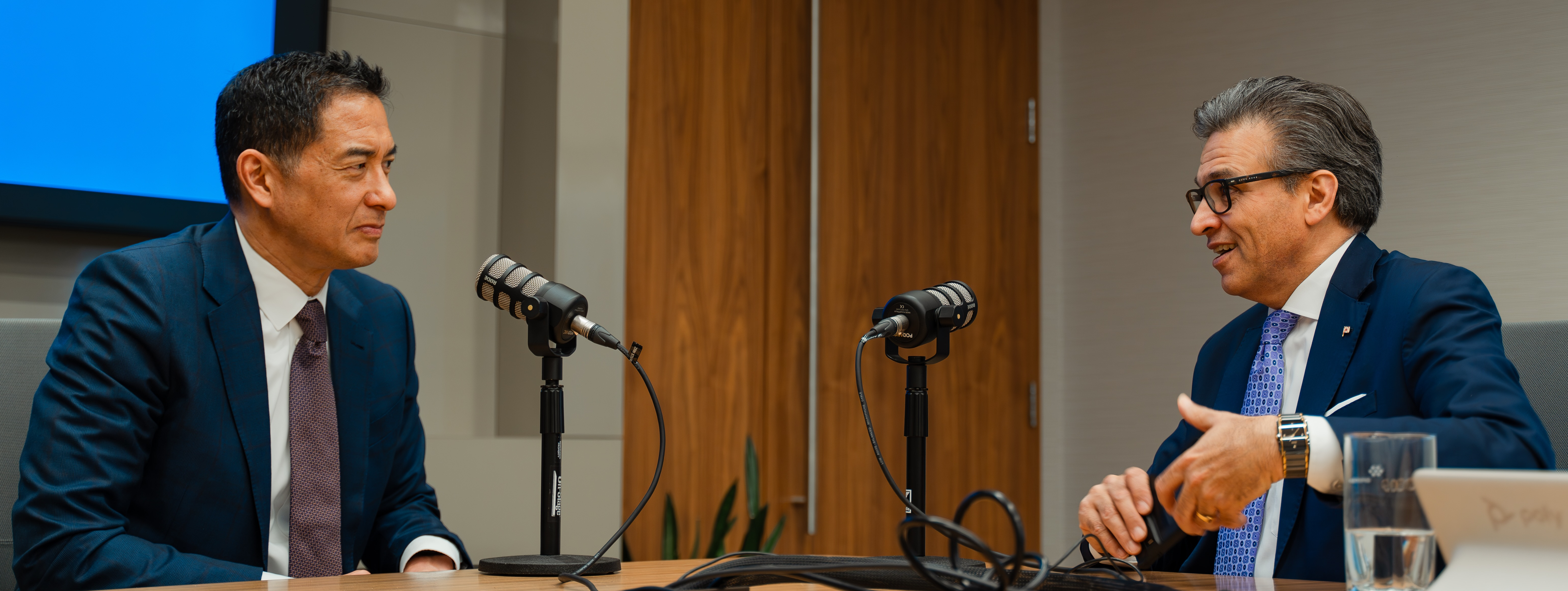The COVID-19 pandemic has changed how Canadians live, work and interact . Whether we are working from home or trying to stay in touch with friends and family while complying with stay-at-home orders, digital technology has become an essential tool. The demands on Canada’s communications systems have never been greater.
For Bell Canada, the pandemic spurred a rapid increase in network capacity.

“It was clear right away that people needed to communicate in a different way to keep the economy going,” says Mirko Bibic, president and CEO of Bell Canada and BCE. “Audio conferencing, video conferencing … we saw huge surges in usage of our network. We had to invest in more capacity, so we leaned in right away.”
Part of that response involved ramping up connectivity in rural communities, something Bibic sees as key to Canada’s future economic growth.
“Harnessing or unleashing the economic potential of rural areas that can now engage with the digital economy globally – that’s going to be pretty powerful.”
Listen to Goldy Hyder’s full conversation with Mirko Bibic, including a discussion of the effects of COVID-19 on Canadians’ mental health.
To hear more conversations with leaders, innovators and entrepreneurs subscribe to Speaking of Business with Goldy Hyder wherever you get your podcasts.
Mirko Bibic:
We want to be a key contributor to Canada’s economic recovery so how do we do that? The key role we get to play in that is to connect all Canadians. And it’s not just urban, it’s rural. Getting rural Canadians as a key element of Canada’s economic growth going forward.
Goldy Hyder:
Welcome to Speaking of Business. I’m Goldy Hyder, president and CEO of the Business Council of Canada. If you’ve listened to a lot of our Speaking of Business conversations from the past year, you’ll know that one theme keeps emerging. COVID-19 has accelerated change. Pretty much every business leader I speak with talks about it. Transitions that we thought would take years, have happened instead in months. I think about John Love of KingSett Capital telling me about the office towers that are now touchless, or Sabrina Geremia of Google describing her 90-year-old father learning video conferencing.
Goldy Hyder:
As we come out of the pandemic, we are entering a new world. The way we live, and work, and interact is evolving quickly. Just think about the way we communicate with each other and how digital technology has become an essential component in our daily lives. That digital technology will be central to Canada’s economic recovery. But are we ready? Can we keep up with the rapid pace of change? Joining me to talk about this is Mirko Bibic. As president and CEO of BCE, Inc. and Bell Canada, he embraces change. From wireless, internet, and business communications to TV and content creation, Bell is at the center of the changing ways we communicate with each other. Welcome to the podcast, Mirko.
Mirko Bibic:
Thank you, Goldy.
Goldy Hyder:
So here we are, 2021 of March. You became CEO in January of 2020. You probably had a long-term plan, a strategy that you presented to the board. And wham, we’re in lockdown, and COVID arrives. How have you been coping?
Mirko Bibic:
Well, I certainly didn’t have an opportunity to ease my way into the new job, let’s just say, with what transpired at the beginning of 2020, the obvious global event. I certainly didn’t have a gradual easing into putting my own imprint on the organization, which in a sense is a very good thing. I certainly realized pretty quickly that the scope of the job I had stepped into. When you think about 50,000 people depending on the decisions you’re making, and millions of customers. As March hit, and the pandemic hit, it certainly put that into the spotlight for me. Also, you realize the sheer privilege one has to lead an iconic organization like this.
Mirko Bibic:
Goldy, I’d say what really hit home for me, and we talk about this as leaders a lot. But when you’re put into a situation like we all were put into last year, you do realize the importance of all the decisions you make for the broader stakeholders that you serve, and shareholders being clearly paramount there, but not only stakeholders. And I refer to employees, and I’ll do that again. We have 50,000 employees depending on those decisions. They’re all individuals. They all have families. They’re all fundamental parts of their communities. They want to know what all this means for their jobs, for their company.
Mirko Bibic:
It reinforced to me the importance of constant communication, and communicating in a different way, and communicating that we’re going to do the right things. Communicating that there’s a light at the end of the tunnel, that Bell is strong, that we’re going to continue to serve our customers. I think as March hit, like you said, bang, it hit. That was my immediate focus right at the beginning.
Goldy Hyder:
And how did you and your team respond to what was going to lie ahead here? Did you think about, “Well, what do we need to do to help Canadians get through this?” Because let’s be honest here, you and I are good friends. We go back a long way. When you think about popular companies in the country, telcos weren’t high on that list before this virus. But boy, you hear Canadians now. There’s a lot of gratitude and gratefulness. Is that showing up?
Mirko Bibic:
It is showing up and right at the beginning, we adopted basic principles that many, many companies across the Canadian economy adopted. It was take care of your employees, the health and safety of your employees. Take care of your customers, both from a health and safety point of view, but also in terms of the services you provide, and support your community. So you hear most leaders talking about those being essentially the principles they adopted as the pandemic hit. We did the very same thing.
Mirko Bibic:
So what we did, Goldy, right out of the gates, it was clear right away that people needed to communicate in a different way to keep the economy going. So audio conferencing, video conferencing. We saw a huge surges in capacity or usage of our network. We had to invest in more capacity so we leaned in right away. That was a key focus, invest in capacity. We made decisions that expanded our network rollout even faster. Now you had some companies who were forced to pull back on their investments to manage free cash flow, not just in our industry, but in other industrial sectors. We did the opposite. We leaned in. We built more network. We supported our customers.
Mirko Bibic:
There were waiving overage charges, for example, or halting certain pricing initiatives that we had in our 2020 plan, donating PPE to frontline workers. These are all the things that we did right out of the gates, and basically guided by doing the right thing, recognizing that we’re a huge stakeholder in Canada.
Goldy Hyder:
Now, key to all of that of course, is the capacity to do as you said, accelerate networks, the digital infrastructure that’s necessary. What was the impact on your plans as it related to those kinds of investments as a result of COVID?
Mirko Bibic:
Well, they’re big plans. One of the other things 2020 did is it had to force us out of our customary thinking around our financial model. We have a very stable, well understood financial model that we’ve been following for years, and years, and years. Things that allow us to support our stable dividend and to keep it growing and it’s a fine tuned model. Then something like the pandemic hits and you’ve got to make some of these investments I’ve talked about, and that model kind of temporarily gets put to the side, as you’re dealing with the immediate requirements.
Mirko Bibic:
So what did we do? Our typical capex budget is in that $3.9 billion to $4 billion a year. Last year, 2020, we ended up spending over $4.2 billion, close to $4.2 billion so that’s about $300 million more invested than is typically the case. That’s a lot of investment in its own right but then even the incremental is a lot more. Where we put it all, I mentioned it, it’s investing in more capacity in the networks that keep our customers up and running, and was expanding the network, particularly in rural areas.
Mirko Bibic:
We built close to 150,000 more rural homes than we had planned for 2020. There was just a spirit of getting more Canadians connected or with access to connectivity. So those are the things we did, Goldy.
Goldy Hyder:
Yeah. I think that issue of urban, rural, I want to just drill in it a little bit further on, because it’s becoming quite clear that technology is not just an enabler, but it’s like oxygen for people now. How do you deal with the infrastructure issues in a country as big as ours, because any investments have got to make financial sense to you. What’s the role of not just your company, but what’s the role of government when it comes to connecting people in the remotest of areas, often Indigenous people, too?
Mirko Bibic:
Yeah. So again, I think 2020 was pivotal to me for so many reasons. One is obviously become a new CEO. And like you pointed out in your very first question, two months later, this has hit. But the key thing was to me is, okay. I was saying we’re in this, it’s difficult, it’s extremely difficult, but let’s focus on the future and the positives. One is collaborative working relationship with governments. I think 2020 you talked about some legacy perceptions around the telecom industry. I think those changed in 2020, and that allowed us to have a different dialogue with government, very collaborative dialogue with government.
Mirko Bibic:
Then you think about as we want to be a key contributor to Canada’s economic recovery, so how do we do that? The key role we get to play in that is to connect all Canadians. That’s wireless connectivity, it’s fiber internet connectivity, and it’s not just urban, it’s rural. Getting rural Canadians as a key element of Canada’s economic growth going forward. These are the principles that guide our actions. So what did we do in 2021? In February, when we announced our Q4 results, I was pretty pumped to communicate that we were embarking over the next two years on the most ambitious capital investment program that Bell has ever undertaken.
Mirko Bibic:
And that’s quite something, if you think about it. We’re 141 year old company, and we just announced in 2021 our most ambitious capital investment program. I mentioned earlier, we invest about $4 billion a year in capital. We’re going to increase that by another billion to $1.2 billion over the next two years. The vast majority of that extra investment is going to more connectivity for Canadians.
Goldy Hyder:
This is probably not a fair question, but you know, you mentioned your long history. Clearly, Bell’s been through, BCE’s been through a lot of crises, including the last pandemic before this one. When you look ahead, how much change do you foresee technology bringing about? I remember hearing a futurist saying he predicted 25 years ago that long distance charges would disappear. Well, long distance once upon a time was your biggest cash cow probably. Are you looking ahead and saying, “Well, how else is my business going to change in the next decade or two?”
Mirko Bibic:
Yeah, we do that all the time. I mean, if you take a look back before we take a look forward, you referred to long distance. There was a day where all the revenues generated by Bell was home and business phone, with long distance being a fundamental component of that. Then you have TV distribution comes along, and then that gets disintermediated in varying degrees. Then you have internet connectivity and we’ve evolved all the way through, and legacy internet connectivity and now it’s fiber to the home. We didn’t have an internet in the early 1990s.
Mirko Bibic:
Now we do, and what’s at the heart of the internet is our communications networks. Social media didn’t exist that long ago and now it’s a fundamental part of how we all communicate. That’s dependent on our infrastructure in particular, our digital infrastructure. As we look ahead, 20 to 25 years from now, it’s hard to predict what’s going to take hold, Goldy, but I do know one thing. Our networks will be at the heart of that. I suspect that, well, I don’t suspect I pretty much know, that the social media platforms that we all rely on today will be viewed as pretty quaint.
Mirko Bibic:
When people look back to 2020, 2021, and there’ll be viewed as pretty analog. I can see AR, augmented reality, virtual reality, being fundamental ways and how we communicate data. Data itself being fundamental components of how we communicate. I don’t want to make too many futuristic predictions, but I do know that our communications networks and the investments we’re making now are going to power the way we communicate 20 years from now.
Goldy Hyder:
So what allows you to do that, in terms of your relationship with government, the regulatory frameworks. Are we as a country ready to keep pace with the accelerated change that’s going to be taking place globally?
Mirko Bibic:
Yeah. So what allows us to do that, when you’re making investments, when you’re making investments that Bell’s making, the ones I’ve talked about. You just go back to saying we embarked on the most ambitious capex program ever. I make that decision, in consultation with the board, and what guides me in going to our board of directors and saying, “This is the right thing to do now, like actually invest more,” I have to have comfort that collaboration with government is there. What I mean by that is I need to feel that the government is a partner with me in a sense. I say “partner” in quotes, with me in the sense in that they’re going to implement policies and regulations that are going to encourage these investments.
Mirko Bibic:
In other words, there’s going to be a policy environment in place that says, okay, we should lean into investment. I also do it. I mean, I also made the investment because I have profound optimism about the future, about Canada’s economic recovery and the role we can play in that. Otherwise, we wouldn’t be investing $4.6 to $4.7 billion this year. But underlying that decision is an optimism about Canada’s ability to recover quickly and the role we can play as Bell Canada in enabling that.
Goldy Hyder:
So of course, part of that is relying on people, the need for customers. We just had our lowest immigration year in quite some time. How much concern do you have from a population perspective, the need for us to grow?
Mirko Bibic:
I think that’s really important and I understand the decisions we had to make, in terms of closing borders and reducing immigration in 2020, and in the early part of 2021. But Canada’s economic recovery is going to depend on us having a very open immigration policy and continuing to be a very welcoming society, which we have been to immigration. I think it’s also going to depend on Canada having robust programs in place to upskill our workforce, whether or not it’s new immigrants arriving or existing Canadians who need to upskill their skills, so to speak, so that we can all participate, and they can participate in the new economy.
Goldy Hyder:
You mentioned skills. That was actually where I wanted to go next because rapid change really requires people with the right skills. When I talk to our fellow colleagues at the Business Council and listen to them speak about labor shortages, and the need for skills, and the need for reskilling and training. What are the kinds of things you look for at BCE, in terms of your workforce today, but also your workforce of tomorrow?
Mirko Bibic:
As we’re making these investments that I keep talking about with you, we’re also modernizing our networks. So you’re shifting from more traditional legacy networks to integrated next generation networks. And with that comes a need for different types of skills in our workforce, and primarily, Goldy, software development, cloud computing, artificial intelligence, machine learning, cybersecurity, of course. That’s where most of our employee intake comes from.
Mirko Bibic:
I mean, we’re doubling our employee intake in those areas, both in terms of new employees. We’ve put in place a number of programs designed to allow those of our existing employees who want to refresh their skills, or reskill, or upskill, to do so. Because what I want to do first and foremost is, if I have an existing employee who wants to lean into these new areas, I want to support them.
Goldy Hyder:
So how are you doing that?
Mirko Bibic:
Well, a number of ways. One is we’ve implemented a new program called Bell U, Bell University, or Bell U. It’s an internal online or virtual set of programs where an existing employee raises their hand and gets selected. They go through an intensive training program and on the other, it gets certified with certain professional designations in the areas I talked about. Then that allows them to find a new role in the company that supports these emerging areas.
Goldy Hyder:
One of the things that BCE is, of course, known for in Canada is a mental health and its support for mental health started by your predecessor, George Cope, about a decade ago if I recall. This was your 10th anniversary right last year?
Mirko Bibic:
It was.
Goldy Hyder:
So what’s the future of that program?
Mirko Bibic:
Well, it’s got a bright future. I’m really proud of it as well. George did launch it and led it for 10 years. He did amazing work in that area. It’s one of the many amazing legacies he left behind that was certainly first and foremost in that. I was really proud when I became CEO to announce that we were going to continue with it, make another five-year commitment. So the five-year commitment that I announced back in March, right on the eve of the lockdowns actually last year was another $50 million commitment for five years, which we then later upped to $55 million, because we added an extra $5 million to support mental health initiatives during COVID.
Mirko Bibic:
So it’s going to be by the end of that five-year period, we’ll have invested over $155 million in Bell Let’s Talk and in mental health. If you think back to 10 years ago, and what it really was about was attaching our name to an illness that for far too long, had been stigmatized. It was about creating awareness and acceptance. It was lending the iconic Bell name to it. It was getting prominent Canadians to speak about, and our first spokesperson, as you know, was Clara Hughes. Then that slowly evolved to sharing, talking about the stories of ordinary, everyday Canadians.
Mirko Bibic:
Ordinary Canadians, not just more well-known Canadians. So that’s how it evolved over 10 years. And more recently, and particularly this year, we shifted the emphasis a little bit, not just to be about anti-stigma, acceptance, awareness, but now shifting to action. Encouraging all of us as Canadians, but also governments to take more action here, in terms of access to care. So what’s the future of the program? Five-year commitment, another $55 million, and now leaning into access to care, not only awareness and anti-stigma.
Goldy Hyder:
Well, I’m sure that Canadians can’t thank you enough for not just the last 10 years, but obviously the next five, because sadly it is an issue that you know and I know we hear a lot about at the C-suite. In our last meeting, for example, people talked about this issue of mental health being paramount on the minds of chief executives. I know that might surprise some people, but what are you hearing from your own customers, in terms of how this change in work has impacted people’s mental health and how are they adjusting to it?
Mirko Bibic:
The pandemic certainly has resulted in a whole new set of stress and anxiety that everyone in the workforce has to deal with within organizations, whether or not it’s, how do you juggle? You know, I just had a meeting this morning, actually with some of our HR folks. It’s how do you support women in the workforce with newborns or very young children? Meetings are being scheduled after five o’clock during dinner time. As leaders, they’ve got to be mindful of that. Just because we’re now in a virtual world, doesn’t mean that people should be connected 24 hours a day, particularly not on Zoom calls. So you have to balance these things.
Mirko Bibic:
You have to be very mindful of them as leaders. You have to force yourself and you should do this all the time. I shouldn’t say force, you have to be listening to your employee base and also don’t dismiss or discount the pressures that senior leaders are going through as well. It’s not just office workers. It’s also the most senior leaders. They’re not immune to these pressures. What we’re doing is communication, listening, and we have a whole set of programs for online virtual mental health support.
Goldy Hyder:
Another couple of issues that you’ve had to deal with, as leaders across the world are dealing with, and one of them, of course, happened during COVID was the Black Lives Matter movement, which really brought, legitimately so, a bright shining light on diversity, inclusivity, racism. We saw examples of racism, you and I are speaking here towards the third week of March, racism against Asians in the United States. How is it as a leader while you’re managing a crisis, managing your business, and now you’re also dealing with this kind of an issue that comes at you.
Goldy Hyder:
I would also say the issue of climate change. I’m going to come back to that because I know you made a major announcement about that. But tell us how you coped as a leader on navigating these different elements of a storm coming at you.
Mirko Bibic:
Well when that Black Lives Matter last year and with the tragic killing of George Floyd, and that comes along, again, it’s back to listening to your employees. So our employees are quite diverse, right? You might have 50,000 people working with you. A lot of them, in particular in the GTA, which is a very diverse area of the country. You listen to your employees and they wanted us to lean in and do something. They want to see themselves reflected in their company’s leadership. You know, those are messages I heard then, and I keep hearing.
Mirko Bibic:
I’ve been talking to our BIPOC employees. And so what we did is we made some announcements and developed some initiatives that were very relevant to our BIPOC employee base, but also relevant to our company and the industry we operate in. Made some announcements that we’d increase BIPOC representation on the Bell senior team. We also leaned in and supported some organizations, like the Onyx Initiative, which is an initiative that’s going to provide mentorship to Black students, who are looking to start their careers in the workplace and in the media business.
Mirko Bibic:
Increasing BIPOC representation on either side of the camera on screen and behind cameras. For example, HireBIPOC initiative, it’s called HireBIPOC. So it’s an initiative we led with other broadcasters that say there’s a whole wealth of talent out in Canada, in the BIPOC community that want to work in media and content. So here’s an initiative where we can connect talent and the BIPOC community with broadcasters, as we develop content. So these are the kinds of things that we did that are very relevant to our industry. But allow our employee base to see themselves represented in what we do and who we are.
Goldy Hyder:
I mentioned another issue that you just made a very significant announcement on, and that was a decision very clearly communicated. You’re going to be carbon neutral by 2025. You just made that announcement this March. So what does that mean in practice and what are you going to change in order to achieve that goal?
Mirko Bibic:
Right. So on that note, environmental stewardship’s a very important thing and we’ve always taken this very seriously. Just go back in time just a little bit, before we talk about the new announcement. We were the first Canadian communications company to have our environmental management system certified as ISO 14,001 so that goes back to 2009. We start from a position of always having been leaders in this. What we’re going to do with the announcement is basically, it’s about reducing the ratio of our greenhouse gas emissions relative to our network usage every year, with the goal to getting to becoming carbon neutral by 2025.
Mirko Bibic:
It’s about optimizing facility, and equipment heating and cooling, reducing electricity usage through LED lighting conversion, things like that. Goldy, modernizing our fleet of vehicles so that fuel consumption is significantly reduced. Investing in solar and other renewable energy options. Those are the things that we’re going to do to become carbon neutral by 2025. I’ve been talking about digital infrastructure and all the investments we’re making. As we build out 5G, we’re going to reduce our carbon footprint because 5G can support a thousand times of traffic at half the current levels of energy consumption.
Mirko Bibic:
Beyond just being carbon neutral by 2025 and building fiber to the home, and fiber to business locations, and enabling a hybrid workforce that can work from home, and work from the office, we’re going to reduce the need for travel.
Goldy Hyder:
I was going to say, you don’t even get credit for that, but there’s a lot of people going to be working from home, even if it’s a day of the week.
Mirko Bibic:
Exactly. Those are the kinds of things, but more specifically around the announcement in becoming carbon neutral by 2025, it’s the specific things I mentioned.
Goldy Hyder:
Now, another issue that you’d briefly mentioned, and it’s in the news a lot these days, of course, with the U.S. election that happened and everything else, and that’s the question of cybersecurity. Give our listeners a sense of just what that means for you. I mean, I had heard some in your business talk about the number of threats that come on a daily basis and I was flabbergasted at the number. But what do you deal with on the issue of cybersecurity and what should Canadians know?
Mirko Bibic:
There are attempts to hack into systems, not just Bell networks, but those of our customers each and every day, each and every hour, each and every minute. We’ve got a whole number of lines of defenses that we enable to protect our networks and the networks of our customers. Our customers also supplement what we do with their own cybersecurity initiatives. So it’s a really, really big focus. Canadians and our customers should be aware and know that we’re doing this every day on their behalf. It’s what we need to do. It’s fundamental to trust in the Bell brand. We’ve amplified investments in this area and training in this area.
Mirko Bibic:
Back to your question on upskilling and reskilling a workforce and the areas that we’re looking to hire in and what we do in the programs we have, we’ve partnered, for example, with the University of New Brunswick recently, with what’s called the BRICKS program. It’s actually the Bell Research Intensive Cyber Knowledge Studies program, where we help fund 15 to 20 scholarships a year to train the next generation of cybersecurity specialists. So we’re supporting that ecosystem as well. And it’s so important that we’ve actually restructured our board committees starting this year.
Mirko Bibic:
We’ve created what’s called the Pension and Risk Committee, and that committee, risk committee, one of its key functions is to oversee our cybersecurity initiatives as well. It just shows you the importance that organizations place on cybersecurity, not just Bell.
Goldy Hyder:
Yeah, and the confidence that Canadians need to have in that it’s just going to get greater and greater. So good to hear that and good to hear everything else that you’ve talked about, Mirko. I want to wrap with just a straightforward question. I mean, normally in the C-suite you’re often asked, especially by the consultants, what keeps you up at night? I’m not going to ask you that question because I think you’ve talked a lot about what probably is keeping you up at night these days. What I want to ask you is what are you most optimistic about as you look ahead?
Mirko Bibic:
I mean, I’ve talked about some of the things that keeps me optimistic. I have high hopes for how Canada is going to rebound. I do think that we are going to capitalize as a country on some of the learnings over the past year. You know, things like investing in critical early warning systems, so that next time we’re better prepared. Domestic vaccine production, now this is now me speaking outside of my industry, but I do think that we are going to learn from some mistakes. That gives me a lot of hope for the future.
Mirko Bibic:
A little bit back into my own industry. We are going to be a far more connected country on so many levels. But in terms of communication network connections, we are going to be a far more connected country. That gives me a lot of optimism. Particularly, rural areas are going to be connected, and as I said at the very beginning of our discussion today, harnessing or unleashing the economic potential of rural areas that can now engage with the digital economy globally. That’s going to be pretty powerful. Look, I’m going to repeat myself a little bit here, but we would not have announced the most ambitious capex program in this company’s 141 year history if the CEO didn’t have profound optimism in Canada’s economic recovery.
Goldy Hyder:
What a great note to end on. Thank you so much for doing this.
Mirko Bibic:
Thanks, Goldy.
Goldy Hyder:
Mirko Bibic is President and CEO of BCE Inc and Bell Canada. Now Mirko talked about Bell’s increased investments in digital connectivity. It’s an example of how Canadian businesses mobilized and responded to the COVID-19 pandemic. Employers across all sectors learned quickly how to pivot and adapt to changing circumstances. We’re going to explore that further in our next podcast. When the federal government asked for help in producing medical equipment, we saw a wartime response from manufacturers. One company that answered that call is CAE … it started with ventilators. That led to developing other innovations for the healthcare sector, and a year later CAE opened Quebec’s first workplace mass vaccination clinic. You don’t want to miss my conversation with President and CEO Marc Parent. Here’s a preview: In every war industry has always played a key part as a partner to the government in fighting the fight and this one was no different and we said we can contribute. Industry can put our resources, our facilities to help the government to accelerate the vaccination effort. You can hear that full conversation with Marc Parent on May 20th. And remember you can catch all of our Speaking of Business conversations with innovators, leaders and entrepreneurs by subscribing to our podcast. Search for Speaking of Business wherever you get your podcasts. Or go to our website thebusinesscouncil.ca. Unitl next time, I’m Goldy Hyder. Thanks for joining us, be well everyone.
















